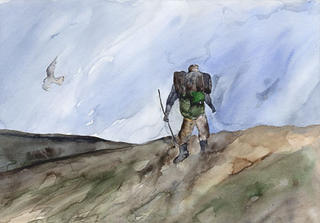 If you want to identify me, ask me not where I live, or what I like to eat, or how I comb my hair, but ask me what I am living for, in detail, and ask me what I think is keeping me from living fully for the things I want to live for. Between those two answers you can determine the identity of any person."
If you want to identify me, ask me not where I live, or what I like to eat, or how I comb my hair, but ask me what I am living for, in detail, and ask me what I think is keeping me from living fully for the things I want to live for. Between those two answers you can determine the identity of any person."- Thomas Merton, from The Man in the Sycamore Tree (taken from Heron Dance on-line newsletter)
Merton's words run deep, don't they?
Ironically, religion and the trappings of religious traditions can serve as barriers between who I am today and who it is that I truly desire to be.
For some of us, religion serves us well as a neat, manageable hedge, protecting us from the radical nature of life's call to our true selves. If I can safely occupy myself with covering all of the arbitrary bases of the traditions of religion and following precisely all of the agreed upon rules of "the faith," I may find it easier to avoid or simply miss many of the real issues life wants to open up before me or press upon me.
Jesus bumped into these same forces.
The system of religion he confronted with its various authorities and "enforcers" found his radical approach to life and, more importantly, to people unacceptable most of the time.
The folks caught up in that system of faith and thought found ingenious ways to neatly explain away human suffering and political injustice, while defending the status quo in pursuit of a rather narrow, self-serving, moralistic worldview.
Jesus called people to a different place.
He invited those who followed him to live for something far beyond selfish desire, materialism and the moralistic "cover" that provided personal, self-justification.
When it came to people, he encouraged inclusion rather than exclusion. When asked to interpret the law, he always explained that the rules in question were best understood as servants of people.
Ever wonder why Jesus identified so closely with the poor? Why did he spend so much time "hanging out" with them?
Many reasons, I am sure. But clearly he understood that the faith and values he wanted to communicate and clearly model would stand over against the values and the religious system that continued to "prop up" a social system of injustice, unfairness and oppression. His life was a one-person campaign for what Moses and the prophets referred to as a "Year of Jubilee."
Obviously, he was not popular with those he challenged and resisted.
But, he knew and lived his purpose. He resisted every force that stood between him and the completion of his mission, including the objections of the religious who remained blind to the fundamental connection between justice and the arrival of the kingdom of God.
No comments:
Post a Comment